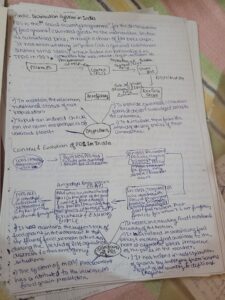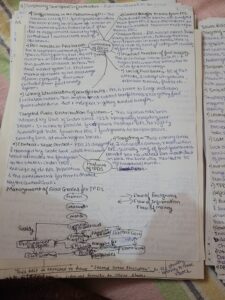- Recent Questions
- Most Answered
- Answers
- No Answers
- Most Visited
- Most Voted
- Random
- Bump Question
- New Questions
- Sticky Questions
- Polls
- Followed Questions
- Favorite Questions
- Recent Questions With Time
- Most Answered With Time
- Answers With Time
- No Answers With Time
- Most Visited With Time
- Most Voted With Time
- Random With Time
- Bump Question With Time
- New Questions With Time
- Sticky Questions With Time
- Polls With Time
- Followed Questions With Time
- Favorite Questions With Time
Mains Answer Writing Latest Questions
Questions -Analyze how the digital transformation of the Public Distribution System (PDS) in India helps address the challenges it faces.(200 words)
Questions -Analyze how the digital transformation of the Public Distribution System (PDS) in India helps address the challenges it faces.(200 words)
-
Introduction This distribution system forms a fundamental part of the food security plans for the citizens of India. However, with the passage of time, technology has emerged as an essential enabler in the tackling of long-existing issues and the overall PDS functioning. Streamlining Supply Chain MaRead more
Introduction
This distribution system forms a fundamental part of the food security plans for the citizens of India. However, with the passage of time, technology has emerged as an essential enabler in the tackling of long-existing issues and the overall PDS functioning.Streamlining Supply Chain Management:
Technology has profoundly been instrumental in helping to achieve the PDS through computerized systems embedded in supply chain management. Computerized end-to-end supply chain operations have minimized manual interfaces, reducing drastically errors, leakage, and inefficiency.
Biometric Authentication Enhancing Transparency and ePoS
Biometric authentication and electronic Point of Sale (ePoS) devices have immensely contributed to the simplification of the PDS activities. Biometric authentication eliminates ghost and duplicate beneficiaries and therefore ensures that subsidies reach the right customers.
Empowerment of Beneficiaries through Information :
Technology has now allowed online services for the distribution of PDS information. It is now possible for the beneficiary to get entitlement and prices along with the schedule for distribution through their websites and mobile applications.
PDS Operations: Data analytics, Machine learning, and analytics the decisioning process has been enhanced. These technologies enable authority to forecast demand, stock, and exposure points that are prone to a leakage or inefficiency.
See less
Conclusion
From simplifying the supply chain and making it more effective to lending the PD system the transparency it needed and finally to empowering the beneficiaries, technology has been one of the biggest drivers in the change process.



The UPSC (Union Public Service Commission) examination is a prestigious and rigorous test in India for recruiting candidates into the Civil Services, including the Indian Administrative Service (IAS), Indian Foreign Service (IFS), and Indian Police Service (IPS), among others. It is conducted in thrRead more
The UPSC (Union Public Service Commission) examination is a prestigious and rigorous test in India for recruiting candidates into the Civil Services, including the Indian Administrative Service (IAS), Indian Foreign Service (IFS), and Indian Police Service (IPS), among others. It is conducted in three stages:
1. Preliminary Examination: This consists of two objective-type papers — General Studies (GS) and Civil Services Aptitude Test (CSAT). The Preliminary exam tests a candidate’s knowledge of current events, history, geography, polity, and basic aptitude.
2. Main Examination: This is a descriptive test involving nine papers, including essay writing, general studies (four papers), an optional subject (two papers), and one paper on language proficiency. The Main exam assesses a candidate’s in-depth knowledge of various subjects and their ability to articulate and analyze complex issues.
3. Interview (Personality Test): This final stage evaluates a candidate’s personality, suitability for a civil service role, and overall demeanor. It is designed to test the candidate’s mental alertness, leadership qualities, and integrity.
The examination is known for its difficulty and requires comprehensive preparation in diverse areas including general studies, current affairs, and specific optional subjects.
See less